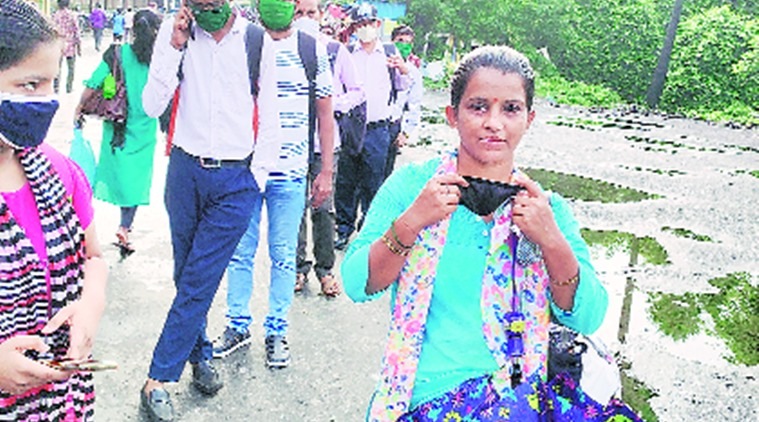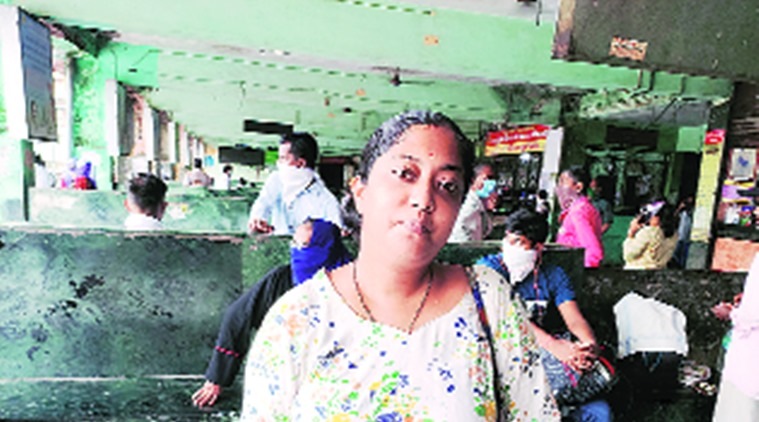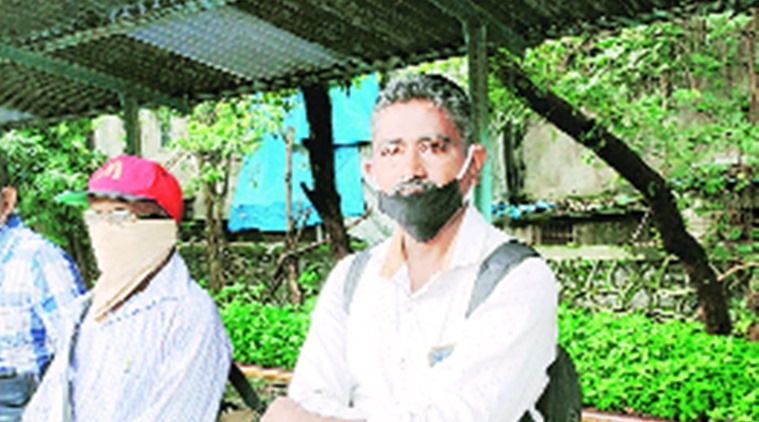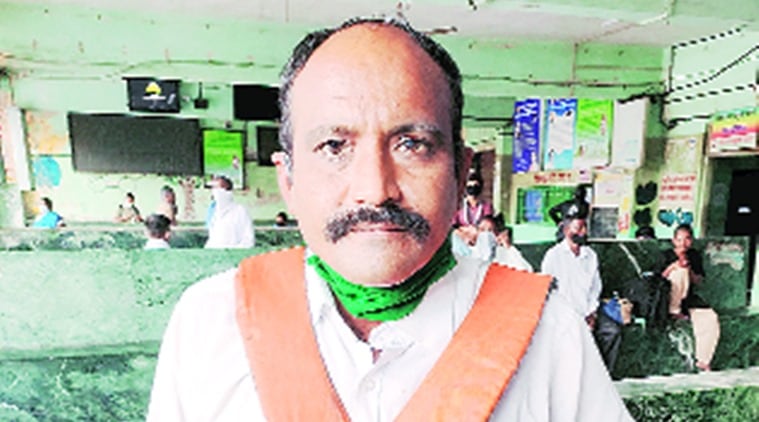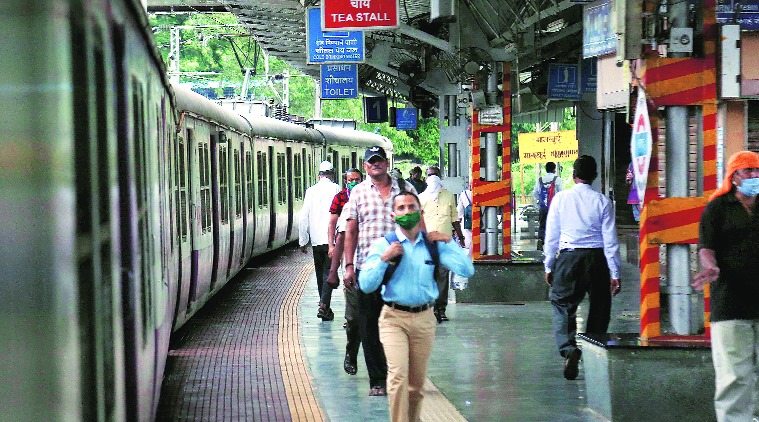 “Government should put the onus on people for their own safety and start the local trains, there is no other way to survive this otherwise” Shilpa Sadvilkar. (Amit Chakravarty)
“Government should put the onus on people for their own safety and start the local trains, there is no other way to survive this otherwise” Shilpa Sadvilkar. (Amit Chakravarty)
Shut since March 23, suburban train services partially resumed from June 15 but operate only 20 per cent of their normal schedule. The Maharashtra government decided against resuming full service of the suburban trains to prevent “non-essential” travel out of concerns that gains made by Mumbai in the fight against coronavirus may be reversed if commuters crowd into trains. However, as Mumbai reopens gradually, and people slowly venture out of their homes to earn a living, the limited number of train services on a network that was ferrying 7.5 million commuters daily before the pandemic, is making it difficult for many from Navi Mumbai and beyond to reach their workplace
Hemangi Bhosle (35),
Lives in Virar with her family of two
Job & location: Office assistant in private firm, in Andheri (W)
Travel time: Minimum 3 hours one way
Bus changes: 2
Waiting time at stops: 45 minutes-1 hour at each stop
Hemangi leaves her one-room tenement in Virar at 7 every morning so that she can reach her office by 10. The commute from Virar to Andheri, which took one hour by train, now takes three hours. The travel expense also eats into a substantial chunk of Hemangi’s salary from her new-found job, which she joined 45 days back. Of the Rs 7,000 that she got as salary last month, she spent Rs 3,000 as travelling expense to reach her office. A monthly pass on Mumbai’s suburban trains between Andheri and Virar costs Rs 215. With no local trains, she has to change two buses and walk for at least 15 minutes before she can reach her workplace. “This is my first job, I really cannot afford to make any mistakes and report late to work,” she says.
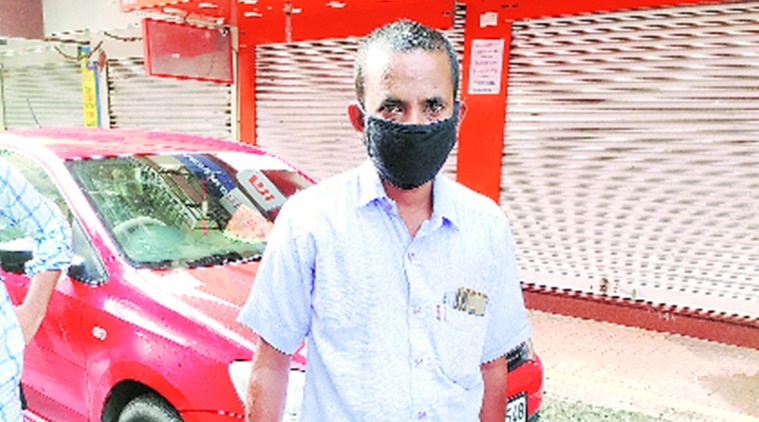
Patiram Yadav (42),
Lives in Virar with his family of five
Job & location: Carpenter attached with a shop in Borivali
Travel time: Minimum three hours one way
Bus changes: 1
Waiting time at stops: Over an hour
Patiram reaches Virar bus stand at around 8 am and reaches Borivali around 11 am to 12 pm. The commute that took not more than 45 minutes in train now takes at least three hours. He is called to work only on days when the work is heavy and more hands are needed and given a daily sum of Rs 400. With the one-way bus fare between Virar and Borivali costing him Rs 60 and another Rs 20 on auto, Patiram spends Rs 160 per day on his traveling leaving him with just over Rs 200 as his daily earning. Only if the trains were running, he would travel the same distance in Rs 215 for a monthly pass. His family survived the lockdown on the ration packets distributed by NGOs. With the gradual opening of the city, that too has now stopped. While waiting patiently in the queue for a bus at Virar, Yadav said, “Waise bhi beemari se nahi toh bhook se mar jaenge ghar baith kar, train chala de toh shayad do paise kaa aasra ho jae.”
Shilpa Sadvilkar (40),
Lives in Dombivali with her family of three
Job & location: Self-employed, travels to CSMT and Badlapur
Travel time: 1.5 hours one way
Bus changes: 2
Waiting time at stops: 45 mins to 2 hrs
Shilpa reaches the Dombivali bus depot at around 9 am and waits for a minimum 45 minutes to board a bus to Kalyan. She switches buses in Kalyan to reach Badlapur. Had trains been functioning, she would have covered the distance in 30 minutes as against the 90 minutes she spends now. She spends around Rs 3,000 per month as bus fare while earning around Rs 16,000 per month; the same journey in a train would cost only Rs 315 as a monthly pass. She is the sole breadwinner for her family of three after her husband, who worked as a clerk at a private firm, lost his job during the lockdown. She earns her living by selling incense sticks that she makes herself after fetching raw material from CSMT and delivering her finished products to her clients in Badlapur. Sometimes at CSMT, Shilpa ends up waiting for two hours for a bus that would take her back home. “Government should put the onus on people for their own safety and start the local trains, there is no other way to survive this otherwise,” said Shilpa.
Ajit Nair (56),
Lives in Vasai with his family of four
Job & location: Print supervisor at publication house in Bhiwandi
Travel time: 4 hours one way
Bus changes: 2
Waiting time at stops: 45 mins to an hour
It takes Nair two bus changes to reach from Vasai to Kapurbawdi in Thane. He then hops on to a company bus that takes him to his workplace. Pre-lockdown, Nair would manage to reach Diva from Vasai in an hour. Post the lockdown, the same journey takes over three hours. He spends nearly Rs 200 per day, while a railway pass would just cost him Rs 215 a month. The looming fear that he may be sacked means that Nair undertakes the arduous journey every day. According to him, the travel back home is even more difficult with no buses stopping at Kapurbawdi. Blaming the government for problems faced by workers like him, Nair said, “The private offices pressurise workers to report to work as government assured that there are buses and autos plying but in reality, there is hardly any transportation. No one knows the difficulties that people are facing.”
Deepak Ahire (42),
Lives in Kalyan with his family of seven
Job & location: Marketing executive in an office located in Bhayander
Travel time: 2.5 to 3 hours one way.
Bus changes: 2
Waiting time at stops: Up to 2 hours
Ahire spends about Rs 300 per day on his travel now as against the Rs 1,500 that he would spend to buy a monthly first class pass on the suburban trains. On most days, Ahire reaches Kalyan bus depot of MSRTC and ends up standing in queue for at least two hours before he gets a bus to Borivali. “Often, I have lost my clients after I could not reach on time. Buses are unreliable and government should open up trains for private workers,” said Ahire. He further pointed out that even as bus frequency on some routes to Mumbai have been increased after ‘Mission Begin Again’, there are no direct buses to Mira-Bhayander and such areas. For reaching his office in Bhayander, he travels from Kalyan to Thane and then takes another bus that will take him to Bhayander. He further pointed out that even when buses are parked, there are no employees to run additional buses.
“The government employees have a secure job and yet they are the ones given the privilege to travel in trains but it is the private employees who are left without jobs and those who still have one don’t have transportation to reach there,” said Ahire.
Salman Ansari (28),
Lives in Bhiwandi with his family of six.
Job & location: Lokmanya Tilak Hospital at Sion
Travel time: 2 hours
Bus changes: 2
Waiting time at stops: One hour
With poor frequency of buses to Kalyan and Sion, Salman ends up waiting for over an hour at Bhiwandi depot. According to Salman, there was a bus every 15 minutes providing the crucial connectivity from Bhiwandi to Kalyan but that has been completely stopped. And now, despite buses being parked, there are no conductors or drivers. “There is no timetable, you go up to a driver and he says, he is going to fetch the conductor and as soon as he gets one, he’ll start the bus,” said Salman. Auto drivers charge Rs 100 for Kalyan, a distance that was covered in Rs 15 in a bus. “One cannot afford to spend this kind of money every day,” said Salman, who after waiting for an hour had to take the auto to reach Kalyan from where he would take a bus to Sion.
Nawaz Shaikh (49),
Lives in Vasai Road with his family of four
Job & location: IT expert employed with a co-operative bank at Mumbai Central
Travel time: 3.5 hours
Bus changes: 2
Waiting time at stops: 45 minutes
Shaikh ensures that he reaches the Vasai depot at dot 6:30 am, even a delay of five minutes would mean he cannot get the seat in the first bus that leaves at 6:45 am. He reaches office by 11 am, which would otherwise take only an hour. He spends Rs 3,500 on bus fare for a month, which in a train would only cost Rs 300 a month. “If I’m not in the first 25 passengers that the bus can accommodate, I’m sure to be marked late in office, something that I cannot afford,” said Nawaz. It then takes him around two hours to reach Haji Ali, where he gets down and takes another BEST bus to reach his bank in Mumbai Central. Nawaz is not counted as an essential worker as he is an employee of a co-operative bank instead of a nationalised bank. In the evening, he has to ensure he is in time at Mantralaya from where buses leave for Vasai Road. “If one has to spend about six hours every day in travel how can one be expected to perform. It is getting increasingly difficult every day without trains,” said Nawaz.
Rafeeq Khan (43),
Lives in Bhiwandi with his family of five
Job & location: Imitation jewellery workshop in Bhuleswar
Travel
Time: 2 hours
Bus changes: None
Waiting time at stop: One hour
The poor frequency of buses has forced Rafeeq to take private tempos that charge about Rs 150 from CSMT to Bhiwandi. In a train, it cost him Rs 315 for a monthly pass between Kalyan and CSMT. Rafeeq invariably has to wait for over an hour before any bus is scheduled for CSMT from Bhiwandi. For Rafeeq, the frequency of buses is manageable until 10 am but after that it’s nearly impossible to get a bus to anywhere. “Just yesterday, I waited for two hours for a bus and then simply returned home,” said Rafeeq. He initially tried using his bike for the commute but with the rains it became increasingly difficult. “If the government won’t have a reliable transportation system, no one can really start their work again,” said Rafeeq.
